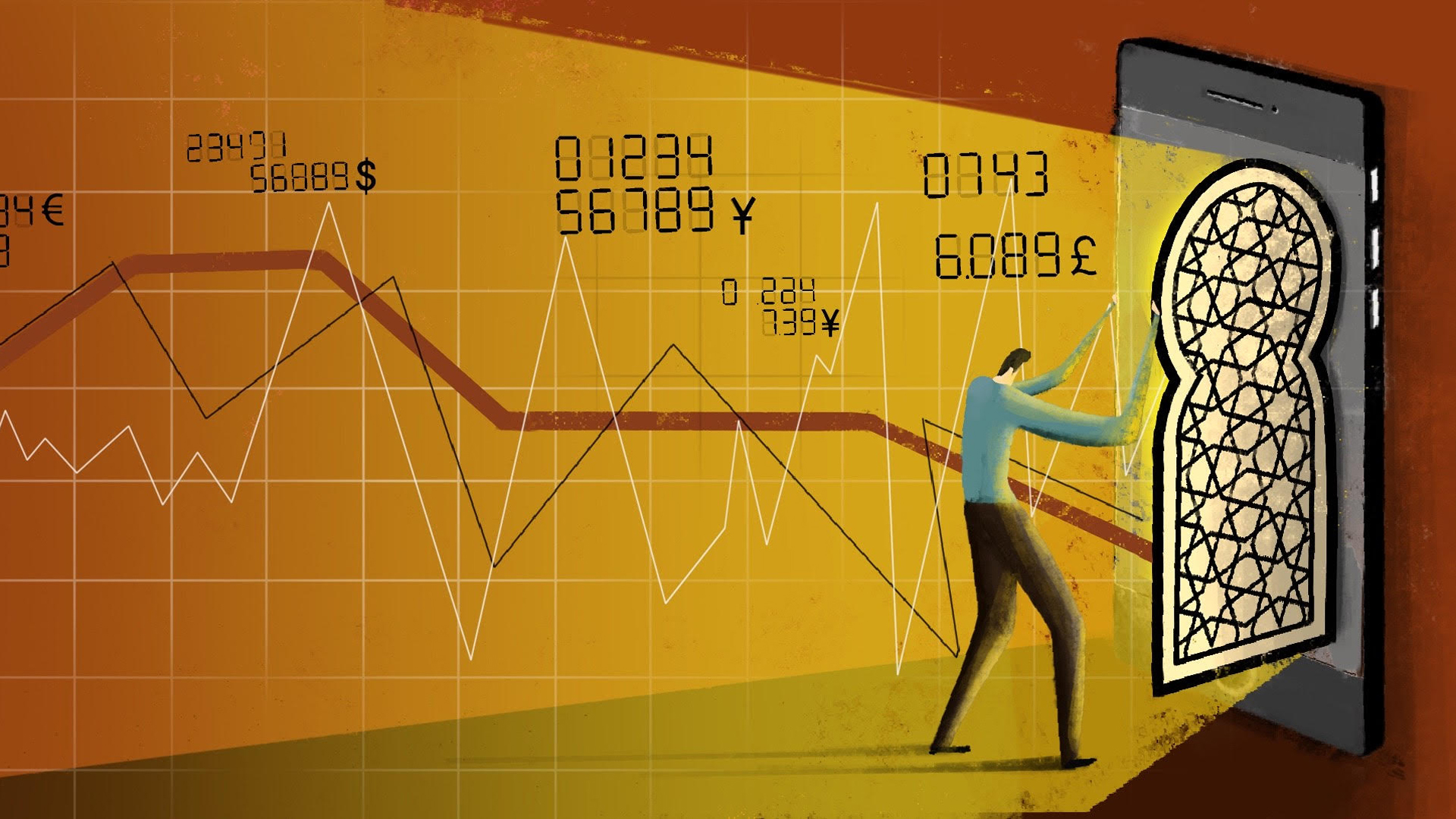Muslims make up about a quarter of the world’s population and are said to be the fastest growing religious cohort.[1] As such, the potential market for Islamic financial services is enormous. The median age for Muslims globally is just 24 years old, making a majority of them “digital natives” ready for digital Islamic financial solutions.
“You're not going to be able to access that younger generation if you’re not in the palm of their hand,” says Aris Parviz who heads the North American operations for Wahed Invest, a sharia-compliant - or halal - digital investment platform.
Islamic fintech marries sharia compliance with digitally-delivered financial solutions. This makes it easier for Muslims to access savings, investments, insurance and mortgages that are in line with the principles of their faith. Particularly during the coronavirus pandemic, as countries implement social distancing measures, financial companies are relying on digital channels to ensure customers have access to their services.
Key characteristics of sharia-compliant or halal investing
✖ Profiting from debt is prohibited
✖ Interest payments are prohibited
✖ Investing in businesses that profit from alcohol, arms, tobacco and gambling is forbidden
✔ Earnings are generated through profit-sharing
✔ Islamic finance instruments must be backed by real assets
For Wahed Invest’s co-founder, Junaid Wahedna, the need for such services became clear after his encounter with a New York taxi driver. The Muslim driver was looking for ways to invest in accordance with the values of his faith and sought advice from his imam. His imam’s advice was to put his life savings into Apple stocks. The company’s relatively low debt levels, the imam surmised, made it permissible. “Now, Apple is an amazing company today, but it could have been the AOL of the 1990s,” says Mr Parviz. “No one thought AOL was going to go under, and then what happened?”
The conversation drove Mr Wahedna to establish a sharia-compliant robo-advisory investment firm. “The average person doesn't know too much about Islamic finance investing and doesn’t have access to financial advisors,” Mr Parviz explains. “Our aim is to give Muslims across the globe access to financial markets, to help them improve their financial wellbeing.”
Since launching in 2017, Wahed Invest has amassed over 50,000 users and established offices in the US, UK and Malaysia. “The whole Islamic faith is over 1.8bn people,” says Mr Parviz. “It’s an amazing opportunity because a lot of the conventional players don’t pay attention to it.”
Yielders, a UK-based property investment crowdfunding platform, was born of similar frustrations. “Growing up as a Muslim in the UK, there was a real lack of investment opportunities that did not compromise my faith,” says Irfan Khan, its founder. “Most of the available opportunities were either interest-bearing or too high risk.” His platform lets investors buy into buildings already earning a rental income with as little as £100, without interest or leverage.
Delivering Islamic fintech
Businesses offering Islamic investment solutions digitally must deliver on two fronts: compliance and access.
To ensure compliance with sharia law, fintechs have to navigate an intricate set of rules. Interest charges, or riba, are prohibited. So too are investments in “sin stocks” of businesses profiting from alcohol, arms, tobacco and gambling. The rules also prohibit profiting from debt and require investments to be backed by real assets. This has led to the creation of sukuk—sharia-compliant financial certificates, similar to bonds, which give an investor part-ownership of an underlying asset. There are also detailed investment criteria surrounding a company’s leverage and interest income.[2]
For access, selecting the right technologies is key. Fintechs are deploying a growing array of halal payment platforms, e-wallets, insurtech and remittance services through mobile phone apps. New digital Islamic banks such as the UK’s Niyah and Germany’s Insha are offering interest-free products through similar channels.
Beyond product delivery, technologies used by fintech firms promise to bolster Islamic finance by driving efficiencies and reducing costs. In turn this could cut costs of payment services and transactions, says Mohamed Damak, global head of Islamic finance at ratings agency S&P Global Ratings.
Technologies such as artificial intelligence might also help to improve compliance. Blockchain, if deployed at scale, has the potential to reduce the risk of fraudulent transactions, Mr Damak argues. Emirates Islamic Bank is already using the technology to authenticate paper cheques in the United Arab Emirates.[3]
Blockchain for sukuk
To address high costs and a lack of transparency within the sukuk market, “blockchain could literally be the missing link,” according to Mr Damak of S&P Global Ratings.
He expects blockchain technologies will open the market to smaller companies by cutting the cost of issuing a sukuk. In 2019 an Indonesian microfinance institution, BMT Bina Ummah, used a platform created by startup company Blossom Finance to raise US$50,000 in what it claimed to be the first blockchain sukuk.
On transparency, he explains: “At present an issuer can substitute one underlying asset with another without informing investors, even though it can completely change the risk profile of the transaction. Blockchain will resolve that by documenting every change.”
In addition, in instances where there are dozens of assets underlying a single certificate, he predicts that the technology will show investors in real time which ones are underperforming.
The Islamic fintech environment
To achieve ambitious expansion plans, young Islamic fintech firms require a supportive business environment. Incubators are springing up in the Middle East[4] and Malaysia is home to more than 200 fintech startups given its strong public support of the digital economy.[5]
Harmonising regulation between countries is an important step. When US-headquartered Wahed Invest first entered Malaysia “the whole concept of sharia-compliant robo-advisory was very new,” Mr Parviz recalls. “So, the regulators had to issue us with a new type of licence altogether.”
Investment, however, is only trickling into sharia-compliant fintech. “There are still very few venture capital and private equity firms that are actively looking at investing in this space because it’s new and they’re waiting to see who’s going to develop the market,” says Mr Khan of Yielders.
“Islamic finance is a US$2trn industry, so for fintech to have a meaningful impact on its growth we need lots of investment, and that is not something we’re really seeing,” Mr Damak echoes.[6] Among the handful of players are US-based private equity group Frost Capital (which invested US$8m in Affinis Labs, a company that builds Islamic business innovation ecosystems) and Wahed Invest’s investors Boston-based Cue Ball Capital and BECO Capital, a Middle Eastern venture capital firm.
Widening the consumer base
In places where Islamic fintech vies with conventional alternatives, startups will have to compete on more than their religious credentials. “Sharia compliance will help them attract a certain percentage of their market,” Mr Damak explains. “But the biggest portion will be people who would have a preference for Islamic products but go for conventional alternatives if they are cheaper [or offer higher returns].”
When it comes to portfolio investment, “[sharia-compliant models] perform quite competitively as compared to the broader market,” argues Wahed Invest’s Mr Parviz.[7], [8] This allows Islamic fintechs to “actually attract some folks who are just interested in the ethical aspects of it,” he says.
In the UK, the competitive savings rates offered by brick-and-mortar Islamic banks have attracted a host of non-religious depositors.[9] Yet in general they lack their competitors’ economies of scale. High prices for products such as mortgages drive many consumers towards conventional alternatives. If advanced technologies can help to reduce costs, Islamic fintechs might win them over.
More importantly, Mr Khan warns that “many of the newer fintechs need to be careful about how they’re pitching themselves—not to make the same mistakes as traditional financial institutions by focusing [only] on that core Islamic market.”
His solution is to pitch to a wider market. Yielders does not actively promote its Islamic credentials. Almost a quarter of its investors are non-Muslims, a share which Mr Khan wants to grow to more than two-thirds. “I didn’t want people to come to us just because we were sharia-based,” he says. “I wanted people to come to the platform firstly because of the returns that we offered.”
Deploying sharia-compliant financial solutions through digital channels could drive the next wave of growth for Islamic finance. Islamic fintech is poised to deliver financial services sought by a young, middle-class Muslim community that has largely been ignored as well as those seeking ethical financial solutions at the speed and cost of modern finance.





